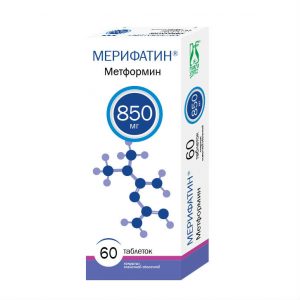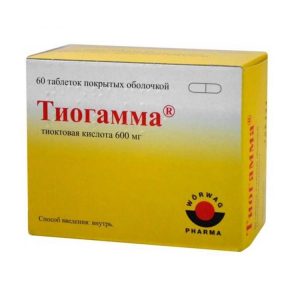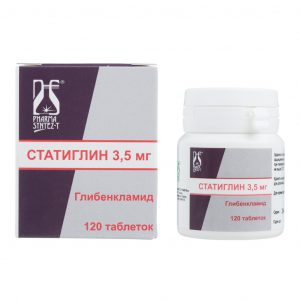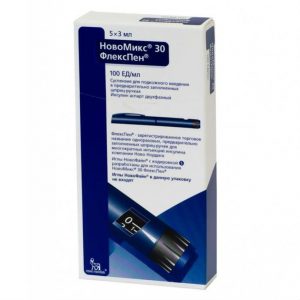Description
Release form
Tablets
Packaging
In plastic bottles of 30 pcs. 1 bottle in a box.
Indications
diabetes insipidus of central origin (diagnosis and treatment), polyuria or polydipsia of central origin (trauma, brain disease, after surgery in the pituitary gland), primary nocturnal enuresis to determine the concentration ability of the kidneys hypocoagulation (with hemophilia A and von Willebrand disease, except type IIb).
Contraindications
Hypersensitivity, anuria, edema syndrome of various origins, plasma hypoosmolarity, decompensated heart failure, polydipsia (congenital or psychogenic), the need for diuretic therapy, predisposition to thrombosis. For iv administration – unstable angina, von Willebrand disease type IIb. For intranasal administration – allergic rhinitis, nasal congestion, swelling of the mucous membrane of the nasal cavity, upper respiratory tract infection, impaired consciousness, condition after surgery. Caution. Renal failure, bladder fibrosis, childhood (up to 1 year), old age, impaired water-electrolyte balance, potential risk of increased intracranial pressure, pregnancy.
Use during pregnancy and lactation
Adequate and strictly controlled studies on the safety of desmopressin during pregnancy and lactation have not been conducted. If it is necessary to use desmopressin in this category of patients, the expected benefits of therapy for the mother and the possible risk to the fetus or child should be weighed.
Special instructions
With swelling of the nasal mucosa, severe rhinitis, desmopressin absorption may be impaired with intranasal use. In such cases, sublingual administration is recommended.
In order to avoid volume overload when prescribing desmopressin, special monitoring of the condition in patients of the following groups is necessary: ² ¹ ² ¹children and adolescents, the elderly, people with impaired water and / or electrolyte balance, people with a risk of increased intracranial pressure. With caution prescribed for impaired renal function, cardiovascular disease, fibrosis of the bladder.
When using desmopressin as a diagnostic tool, as well as with the on / in the introduction of repeated doses should not be forced hydration (either orally or parenterally), the patient should take as much fluid as is needed to quench thirst. The use for the study of the concentration ability of the kidneys in children under the age of 1 year should be carried out only in a hospital.
Composition
Desmopressin acetate – 0.2 mg.
Excipients: lactose starch potato povidone magnesium stearate.
Dosage and Administration
Inside. The optimal dose is selected individually. Central diabetes insipidus: the initial dose is 0.1 mg 3 times a day, in the subsequent dose is selected depending on the response – from 0.2 to 1.2 mg / day. For most patients, the optimal dose is 0.1-0.2 mg 3 times a day.
Primary nocturnal enuresis: the initial dose is 0.2 mg at night, with inefficiency, the dose is increased to 0.4 mg. The decision to continue treatment is made after 3 months of continuous therapy based on clinical data observed after discontinuation of the drug for 1 week. Compliance with a limited intake regimen should also be monitored.
Nocturia (nocturnal polyuria): the initial dose is 0.1 mg at night, if ineffective after 1 week, the dose is increased to 0.2 mg and then, with a weekly increase, to 0.4 mg. One should be wary of the possibility of fluid retention in the body.
In patients 65 years of age and older, the level of sodium in the blood should be monitored before treatment, after 3 doses and after increasing the dose.
When symptoms of fluid retention and / or hyponatremia appear (headache, nausea / vomiting, weight gain and, in a severe case, convulsions) it is necessary to immediately stop treatment with the drug until the patient is completely recovered. With the resumption of treatment should be more strictly monitor the restriction of fluid intake by the patient.
Side effects
From the central nervous system: headache, dizziness, impaired consciousness, coma.
From the digestive system: intestinal colic, nausea, vomiting.
From the cardiovascular system: moderate increase in blood pressure (when used in high doses), arterial hypotension (with rapid on / in the introduction).
From the respiratory system: rhinitis, swelling of the nasal mucosa.
From the urinary system: oliguria.
From the side of metabolism: water retention in the body, hyponatremia, hypoosmolality, weight gain.
From the endocrine system: algodismenorea.
On the part of the organ of vision: lacrimation disorders, conjunctivitis.
Allergic reactions: skin rash.
Drug Interactions
Indomethacin may increase the intensity (but not the duration) of desmopressin. Facilities, which have the ability to increase the release of ADH (including tricyclic antidepressants, chlorpromazine, carbamazepine) can cause an additive antidiuretic effect, which increases the risk of fluid retention.
overdose
Symptoms: An overdose leads to increased drug duration and increased risk of fluid retention and hyponatremia. In case of overdose, consult a doctor.
Treatment: Hyponatremia therapy should be individual, it is mandatory to discontinue the drug and remove the restriction on fluid intake. In the presence of symptoms of overdose infusion of isotonic or hypertonic sodium chloride solution is possible. In case of severe fluid retention (convulsions and loss of consciousness), furosemide should be prescribed additionally.
Storage conditions
In a dry place, at a temperature not exceeding 25 ° C and relative humidity up to 60%.
shelf life
2 years
dosage form
tablets
Possible product names
MINIRIN 0.0002 N30 TABLE
Minirin 0.2mg Tab. X30! Until 06.10./
Minirin 0.2mg Tab. X30 (R)
Minirin 0.2mg Tab. X30 (R) / until 01.11g /
Minirin 0.2mg Tab. X30 (R) / until 03.11g /
Ferring GmbH, Germany




